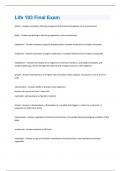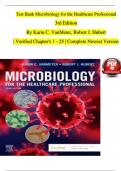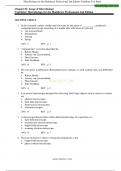Plant kingdom Study guides, Class notes & Summaries
Looking for the best study guides, study notes and summaries about Plant kingdom? On this page you'll find 897 study documents about Plant kingdom.
Page 4 out of 897 results
Sort by

-
Life 103 Final Exam Questions & Answers Already Passed!!
- Exam (elaborations) • 24 pages • 2024
- Available in package deal
-
- $7.99
- + learn more
abiotic - Answer-nonliving: referring to physical and chemical properties of an environment biotic - Answer-pertaining to the living organisms in the environment catabolism - Answer-releases energy by breaking down complex molecules to simpler molecules anabolism - Answer-consumes energy to synthesize a complex molecule from simpler compounds metabolism - Answer-the totality of an organism's chemical reactions, consisting of catabolic and anabolic pathways, which manage the material and en...

-
UTA Microbiology Exam 1 (Ch 1, 2, 3, 7) Latest Update 100% Solved
- Exam (elaborations) • 7 pages • 2024
- Available in package deal
-
- $9.99
- + learn more
UTA Microbiology Exam 1 (Ch 1, 2, 3, 7) Latest Update 100% Solved Microbiology The study of microscopic organisms. Have ubiquitous nature (everywhere), some beneficial, some neutral, some pathogenic (disease-causing) Antoine van Leeuwenhoek Father of microbiology. Invented a microscope strong enough to view microbes "animalcules". Giralamo Fracastoro Regarded as first person to formally postulate that disease was spread by tiny invisible seminaria "seeds of contagion". Robe...

-
Duquesne bio 112 exam 2 latest questions and answers all are correct 2024 graded A+
- Exam (elaborations) • 10 pages • 2024
- Available in package deal
-
- $7.99
- + learn more
Conjugation - Answer-DNA from a donor cell is transferred to an adjacent recipient cell Transformation - Answer-DNA released into the environment by dead cells is taken up by a recipient cell Transduction - Answer-DNA is transferred from a donor to a recipient cell by a virus Three domains - Answer-Eukarya Archaea Bacteria Eukarya and Archaea are more closely related Archaeon Enviornments - Answer-Many archaea are extrelmeophiles carbon fixation and respiration - Answer-Bacteria and arch...

-
Test Bank Microbiology for the Healthcare Professional 3rd Edition By Karin C. VanMeter, Robert J. Hubert | Verified Chapter's 1 - 25 | Complete Newest Version 2024 A+
- Exam (elaborations) • 158 pages • 2024
-
- $12.99
- + learn more
Test Bank Microbiology for the Healthcare Professional 3rd Edition By Karin C. VanMeter, Robert J. Hubert | Verified Chapter's 1 - 25 | Complete Newest Version 2024 A+ Table of content 1. Scope of microbiology 2. Chemistry of life 3. Cell structure and function 4. Bacteria and archaea 5. Viruses 6. Eukaryotic microorganisms 7. Physical and chemical methods of control 8. Microbiological laboratory techniques 9. Microbiological laboratory safety issues 10. Pharmacology 11. Antimicrobi...

-
ASVAB General Science Test |QUESTIONS &ANSWERS| ALREADY PASSED| VERIFIED & UPDATED
- Exam (elaborations) • 25 pages • 2023
-
- $15.49
- + learn more
ASVAB General Science Test |QUESTIONS &ANSWERS| ALREADY PASSED| VERIFIED & UPDATED A major difference between a plant cell and an animal cell is A. plant cells do not reproduce. B. plant cells do not have cell walls. C. plant cells have chloroplasts. D. plant cells die after a year. - correct answer C. Plant cells do reproduce and they do have cell walls. Plant cells do not necessarily die af ter one year. Plant cells do contain chloroplasts, and an imal cells do not. The correct an swer...

-
BIOD 101 Module 2 Portage Learning With Complete Solutions
- Exam (elaborations) • 21 pages • 2024
-
- $20.99
- + learn more
BIOD 101 Module 2 Portage Learning With Complete Solutions What is homeostasis? - Maintaining set points of living conditions What is an example of regulation? - Shivering to regulate body heat What is energy processing? - How an organism utilizes biochemical reactions to produce energy What is the sum of an organism's biochemical reactions referred to? - Metabolism What is ATP? - Biological fuel or energy What type of metabolism do many prokaryotes use? - Anaerobic What is photo...

-
Chapter 01: Scope of Microbiology VanMeter: Microbiology for the Healthcare Professional, 2nd Edition. Questions& Correct Answers. Latest Updates-2023. Rated A+
- Exam (elaborations) • 129 pages • 2023
-
- $15.99
- + learn more
Chapter 01: Scope of Microbiology VanMeter: Microbiology for the Healthcare Professional, 2nd Edition. Questions& Correct Answers. Latest Updates-2023. Rated A+ MULTIPLE CHOICE 1. In the sixteenth century a father-and-son team, by the name of , produced a compound microscope consisting of a simple tube with lenses at each end. a. van Leeuwenhoek b. Semmelweis c. Janssen d. Hooke ANS: C REF: p. 3 2. “Animalcules” were first described by a. Robert Hooke. b. Antony van Leeuwenhoe...

-
VanMeter: Microbiology for the Healthcare Professional, 2nd Edition
- Exam (elaborations) • 129 pages • 2023
-
- $12.99
- + learn more
1. In the sixteenth century a father-and-son team, by the name of __________, produced a compound microscope consisting of a simple tube with lenses at each end. a. van Leeuwenhoek b. Semmelweis c. Janssen d. Hooke ANS: C REF: p. 3 2. “Animalcules” were first described by a. Robert Hooke. b. Antony van Leeuwenhoek. c. Hans Janssen. d. John Needham. ANS: B REF: p. 3 3. Micrographia, a publication illustrating insects, sponges, as well as plant cells, was published by a. Robert ...

-
ASVAB General Science Test Questions and Answers Graded A+
- Exam (elaborations) • 14 pages • 2024
- Available in package deal
-
- $10.49
- + learn more
ASVAB General Science Test Questions and Answers Graded A+ A major difference between a plant cell and an animal cell is A. plant cells do not reproduce. B. plant cells do not have cell walls. C. plant cells have chloroplasts. D. plant cells die after a year. - correct answer C. Plant cells do reproduce and they do have cell walls. Plant cells do not necessarily die af ter one year. Plant cells do contain chloroplasts, and an imal cells do not. The correct an swer is therefore choi...

-
ASVAB Science Latest Version Graded A+
- Exam (elaborations) • 18 pages • 2023
- Available in package deal
-
- $9.99
- + learn more



